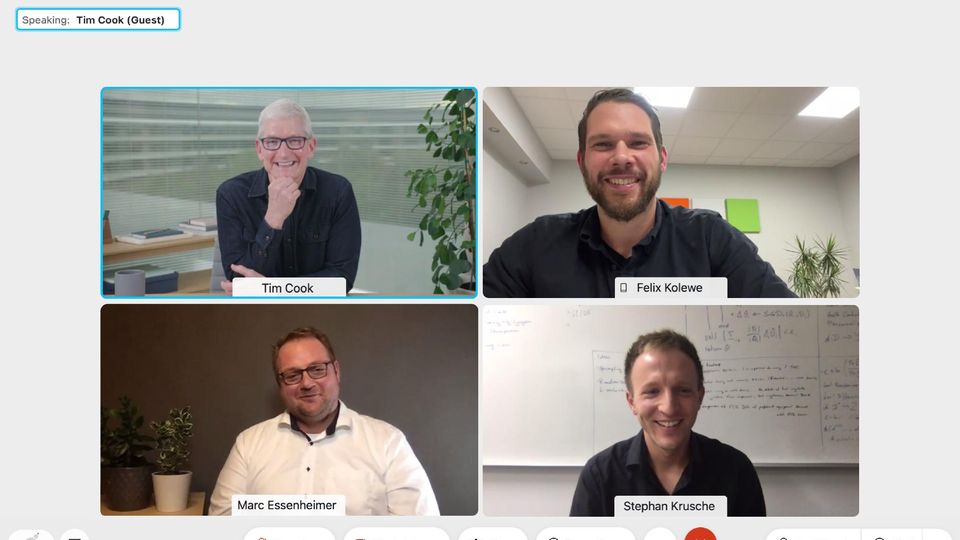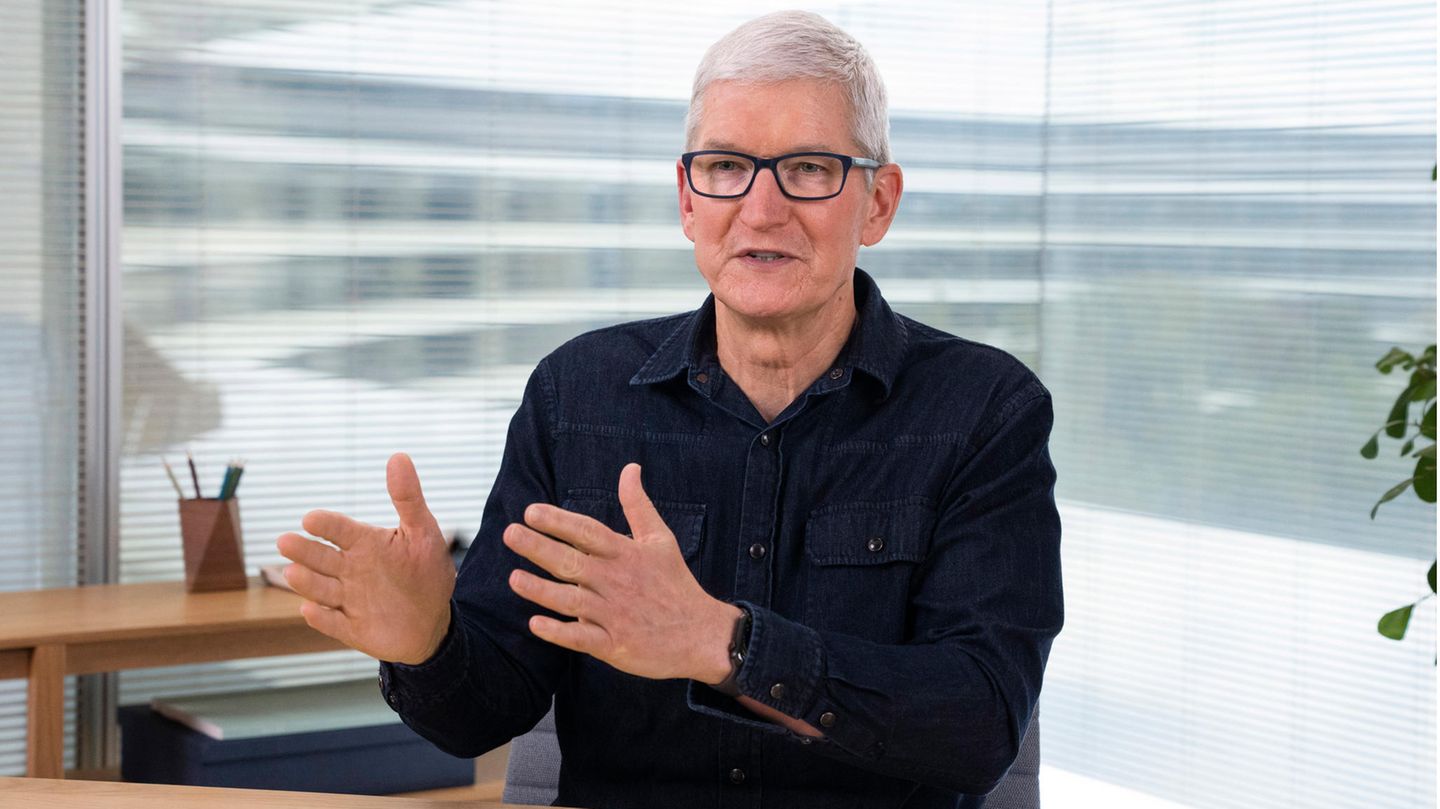Modern reality needs to be addressed more at school – everyone agrees on that. But a tablet in your satchel is not enough. In conversation with the stern Apple CEO Tim Cook defines exactly what students should be able to do at the end of their school career, and explains why programming prepares them for other jobs.
If the iPhone were a kid, it would have started eighth grade in the summer. It has been 14 years since Apple ushered in the smartphone era with the first model – freed the Internet from the constraints of the home computer and made it an omnipresent phenomenon. But in the everyday school life of children who grew up in this world, the topic is often far too little present. The digitization of education is lagging behind the global development – not only in Germany. In conversation with the stern Apple CEO Tim Cook explains what expectations he would have from a real digital education. And why it means a lot more than a tablet in the classroom.
“It is even more important for children than learning a second language. It is the only global language,” he explains when asked whether programming is as essential today as reading and arithmetic. But he is less concerned with the program code itself. “Programming teaches people to question things critically, it relies to a large extent on creativity. It’s a great mix of problem-solving, the ability to think critically, and creativity, all of which are combined into a package,” he enthuses.
Digital education begins in preschool age
Under the motto “Everyone can program”, the group therefore offers materials that are intended to introduce people to the topic. And that even at a young age: The first entry-level materials are aimed at children of preschool age who learn to understand the logic of programs with simple means such as painting or dancing. “You don’t have to want to become a computer scientist or a programmer, but knowing what you can do with it, gauging the power of code, is a very essential skill,” explains Cook. “And like reading or math, it’s one that should be expanded with age. Just like we do with algebra, geometry or calculus.”
Three teachers with whom Cook agreed to meet at Europe Code Week 2021 also report that the students are definitely interested in the subject. Every year the broad-based initiative tries to bring programming closer to people and offers materials and activities for participating schools. Apple has also supported the initiative for a number of years.
The teachers have very different experiences to share, from the enthusiasm of the students when they learn to program a drone to the challenge of developing an app together with the students. The big thing in common: once the students started using programming for something that excited them, they too suddenly became passionate about the topic.
“Letting students work on it could lead to completely different answers”
Cook shares this experience. When asked by teacher Felix Kollewe from the Villa Wewersbusch school in Velbert how Cook would incorporate current topics such as mindfulness or sustainability into the curriculum, he replied: “I think the best applications are those that enrich people’s lives. This is the case with sustainability as well as meditation. Perhaps you can get students to work on a meditation app. There are of course some, but there is always room for innovation. ”
It also shines through the eyes with which the childless Cook looks at young people. “Letting students work on it could lead to completely different answers than is the case with previous apps. Students see it from the perspective of a young person’s challenge, while most meditation apps are more likely to come from people who are a little older . ”
It is very similar with sustainability. Here, too, apps that are easy to understand, such as recycling or awareness of one’s own carbon footprint, could often provide a different approach. “Things like that can make the complex easy, get people active. Both are great examples of making a difference and making students feel meaningful.” ”

Cook believes that this sense of purpose is the best drive anyway. “Ultimately, people want to change the world, in their own way. They are driven by a sense of purpose, the need to fix things, to change something in some way. I’ve never seen a generation for which this is so great It is true, as it is for young people today. You see that in relation to climate change and a lot of other things: it is brought forward by the young. ”
How do you implement digitization in the classroom?
However, they would have to be taught the appropriate skills in school. But it’s not as simple as that sounds. While mathematics, German or physics have established fundamentals for decades that can be taught in school, the still young world of information technology is in constant, very rapid change. So what things should students learn? There is no question that they should not only be able to operate computers and smartphones. But whether they have to learn specific programming languages that may quickly become outdated, have to understand the logic of algorithms or even deep knowledge such as with artificial intelligence or it is sufficient to master and classify the flood of information of the Internet – this will be discussed further.
By the end of the year, the Conference of Ministers of Education and Cultural Affairs, for example, wants to update its “Education in the Digital World” strategy, which it adopted in 2016. So far, this has been mainly based on the ability to evaluate digital data, complained the Standing Scientific Commission of the Conference of Ministers of Education. She advises the ministries. She demands: Subject-specific tools such as simulation programs for climate change in geography should also be part of the lesson much more frequently. Developing programs should also be learned.

Clear requirement
Cook sees it that way too. And even has a clear idea. “When you’ve finished school, you should be able to develop an app and publish it,” says the Apple boss. But he is not interested in filling his own app store. “It doesn’t have to be a commercial offer, but you should have the skills to create and implement an app from scratch,” he explains.
“I think if you can do that, you can pursue any passion. It is very likely that software also plays some role in that passion. You are much more capable of solving the problems you are in The future will hit if you properly understand the necessary software and its potential. ”
How does coding become attractive?
One of the biggest hurdles is likely to make the often nerdy preoccupation with program code attractive to the masses. Apple has already proven several times that technical topics can be turned into attractive mass phenomena – for example with the iPhone. While computers and the Internet were often awkward to use in the past, the iPhone and the smartphone boom that resulted from it made them ubiquitous everyday companions. Cook believes that this can be repeated with programming.
“With Swift, we developed a programming language that is so easy to learn how to use our products. That was our goal,” he explains. “As a result, the programming language takes a back seat and leaves the stage to creativity, problem solving and critical thinking.” How easy it is is shown by Apple’s “Swift Playgrounds” app, in which even small children can create simple Swift programs by moving program parts back and forth by touch and assembling them according to their own ideas. This removes hurdles. If you want to create more sophisticated programs, you still have to learn code at some point. “Knowing a programming language well enough is important, but Swift makes it very easy,” Cook tries to reassure. “I basically think anyone can learn Swift.”
Valuable teachers
One of the most important problems of digital education will hardly be able to be solved in this way: that of the right staff. Perhaps even more than in other fields, it is often difficult for schools to compete with the often considerably higher salaries in the private sector. The starting salaries in both sectors in Germany are at a similar level, depending on the federal state and occupational field, they are between 45,000 and 50,000 euros. But those who are very good in the digital sector can often quickly negotiate significantly higher salaries. Especially when a move to Silicon Valley is an option.
“In my opinion, teachers are underrated,” says Tim Cook. “I assume that their salaries will rise in the future – and rightly so. Education, more than anything else, is capable of ensuring balance and equal opportunities. The value of this should not be underestimated,” he explains. “Not only in relation to the individuals concerned, but also in relation to society itself. That is why I believe that teachers deserve more appreciation.”
Perhaps he also feels connected to the teachers because he sees passing on knowledge and skills as his own task. At the end of the conversation, when Cook explained his ideas about the usefulness as a motivator for the students, Kollewe offered to accept someone with such ideas as a colleague if Cook were no longer interested in his Apple job. The CEO laughs, flattered. And after a moment’s thought, he adds, “In many ways, that’s exactly my job.”
David William is a talented author who has made a name for himself in the world of writing. He is a professional author who writes on a wide range of topics, from general interest to opinion news. David is currently working as a writer at 24 hours worlds where he brings his unique perspective and in-depth research to his articles, making them both informative and engaging.




